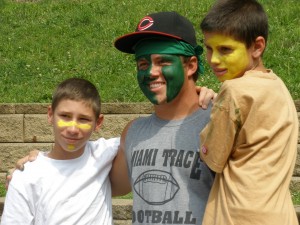Camp Counselors
Obtaining a job as a camp counselor is the best way to experience beautiful areas of the US and build an impressive resume. It’s ideal for undergraduate and graduate students who are pursuing degrees in teaching, counseling, coaching, physical therapy, athletic training, sports psychology, etc. or for skilled athletes who simply love working with youth and want a summer job that feels like play. In fact, some believe that camp employment can be even more valuable than internships in many ways. http://college.usatoday.com/2011/07/27/opinion-skip-the-internship-go-to-camp/ Read more.
Many camps hire both domestic and international staff. Through this exchange, American campers and counselors have the chance to experience foreign cultures, while foreign participants increase their knowledge of American culture.
Benefits:
When considering employment with a summer camp, it is important to understand the personal and professional benefits that are possible. Employers who understand the demands of summer camp will consider your resume above others with camp experience and a recommendation from the camp director. http://www.acacamps.org/blog/counselors/10-reasons-why-businesses-should-hire-former-camp-counselors
Qualifications:
Although qualifications vary based on camp setting, focus and position, most camps are looking for candidates that:
- Are mature adults over the age 18.
- Are willing to work long hours with children and have some prior experience working with children.
- Possess one strong or two or more moderate camp related skills that you can teach or assist in teaching to campers – the stronger your skills and application, the better the chance of a placement at camp.
- Are open minded, energetic, flexible & prepared to work long hours!
- Are in good health.
- Have no criminal record.
Camps vary in many ways including location, program offerings, facilities and dates of operation. However, there are similarities in all summer camps as it relates to the counseling staff, some of which include:
Living Arrangements:
A typical arrangement has 8-12 campers living with 2-3 counselors. The bunk conditions will vary on location and will range from wilderness cabins to modern college dormitories, but all staff must understand that they will, in most cases, be physically in the same room as a group of campers during their assignment (privacy is at a minimum).
Preparation/Orientation:
Counselors will be expected to arrive at the designated camp approximately one week prior to the campers. There is an orientation program where counselors learn the daily schedules along with the camp policies and procedures. During this time counselors are assigned an age group to work with along with a bunk unit where they will live during the summer. There is typically scheduled time when counselors are given training and practice in how to deal with camper conflicts, health issues, and other issues that counselors may encounter throughout the summer.
Roles and Responsibilities:
Summer camp counselors are responsible for ensuring overall camper well-being, keeping campers on schedule with activities, and leading camp activities. A counselor’s work includes assisting with camper management in classrooms, in bunks, on sports fields, and in the dining hall. Counselors may lead daily activities, like crafts, outdoor games, musical performances, and so forth, and may perform other responsibilities, especially at smaller summer camps. Counselors supervise and manage campers at all times, except during scheduled breaks. Counselors may participate in whole camp activities and special events such as talent shows, camp competitions, the camp band, and/or an end-of-the-year musical. A summer camp counselor may also accompany campers during out-of-camp events, including camping trips, hikes, theme parks, whitewater rafting, whale-watching cruises, and ball games. Themed camps such as fine arts camps, computer camps, sailing camps, specific sports camps, etc. hire counselors with more concentrated skills every summer. No matter what the venue, the summer camp counselor is primarily responsible for ensuring that the campers are safe, having fun, and engaged in interesting recreational and educational activities.
As you go through the application and interview process you will be able to speak with camp directors about their particular camp and your role as a counselor. Information about their expectation, salary, time off, etc. will be outlined for you so you can make an informed decision as to accepting or declining an offer.
Season & Duration
The U.S. summer camp season runs from late May, early June through mid to late August, with average employment between 9-11 weeks. Some pre-camp and post-camp work opportunities are possible. This time frame is perfect for those who want to work and still have time to travel or to rest up before the start of the upcoming school year.

